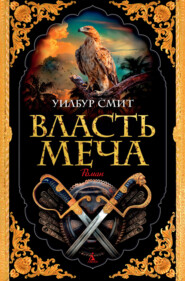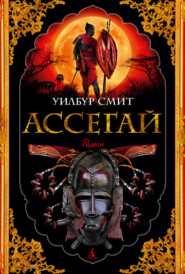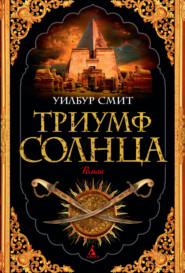По всем вопросам обращайтесь на: info@litportal.ru
(©) 2003-2024.
✖
War Cry
Автор
Год написания книги
2019
Настройки чтения
Размер шрифта
Высота строк
Поля
‘In a race, do you mean?’
‘In a manner of speaking. What I have in mind is this …’ Leon leaned forward onto the table so that everyone could see and hear him clearly. He wanted this to be public. ‘One week from today, we will all meet up again at the polo field. String a rope around all four sides of one of the fields. The competitors will run around the field, outside that rope. D’you follow?’
‘Yes, I believe so,’ said de Lancey. ‘They all run round the field and if a white man wins the race I win the wager, and if your darkie wins, you do?’
Leon smiled. ‘Actually, that would be too easy for the Masai. They would be insulted by the very idea and say that one of their young boys, or even a woman, could win.’
‘Listen here, old man, you sound like you hate your own race.’
‘I wouldn’t say that. I just think that you’re either a good man or you’re not and skin colour’s got nothing whatever to do with it. The most appalling bully and bounder I ever met was a white man.’ Leon paused for a moment and looked around the table at the disapproving faces. Then he added, ‘Mind you, he was a German.’
The frowns turned to smiles and laughs at that and someone called out, ‘I say, what happened to this horrible Hun?’
‘His chest got in the way of a bullet from a .470 Nitro Express hunting rifle.’
‘Was that what passed for your war service?’ asked de Lancey acidly. ‘Better than nothing I suppose.’
The man in the steel-rimmed glasses cleared his throat. There was a philosophical, almost sad look in his eyes and a wry cast to his mouth, as if he were all too aware of the imperfections of man and the shortness of his life. Yet at once the table fell silent. This was the Right Honourable Hugh Cholmondeley, Third Baron Delamere and the unquestioned leader of Kenya’s white population. He had been among the first British settlers in British East Africa, owned two huge estates and was famed for the fortune he had spent trying to establish cattle, sheep and grain farming on his farmland, while preserving the wildlife in the vast areas of country that he left untouched. There was a cane resting on the back of his chair, for he walked with a limp, the result of being mauled by a lion. Yet there was real strength behind those faraway eyes.
‘Gentlemen, gentlemen, let’s not have any unpleasantness,’ Delamere said. ‘I can testify to the fact that Courtney here served alongside me throughout the war, chasing that infuriating German rascal von Lettow back and forth across East Africa. It may also interest you to know that Mrs Courtney assisted us as an aircraft navigator and pilot and was, at my particular request, awarded the Military Medal for her courage under fire. The Courtneys did their bit, you have my word on it.’
Leon gave a little nod of gratitude. ‘Thank you, sir.’
‘Think nothing of it, dear boy. Now, pray finish telling us about your wager. As you know, I rather share your opinion of the Masai.’
That, too, was something known to all the British in Kenya. Delamere even built his homes with the same mud and thatch that the Masai used for their huts. ‘Of course,’ he continued, ‘I maintain that our European civilization as a whole is more advanced than the native African. Still, the individual Masai is a fine man and I might even put a guinea or two into the pot, once I know what I’m betting on. Courtney?’
‘Very well then,’ Leon began. The argument about the war had been entirely forgotten and there was a palpable air of growing excitement as he spoke. ‘I propose that the three white men run in a relay against the solitary Masai. One of them will start alongside him, the starter will fire his pistol and they will both set off around the field. The white man keeps running until he either gives up, or the Masai laps him.’
‘Is that really likely to happen, Courtney?’ Josslyn Hay asked. ‘A polo field must be twice the size of a football pitch. It’s a long way round.’
‘Possibly not,’ Leon replied. ‘I just don’t want anyone to get away with walking. This has to be a race that is run.’
‘Fair point. But I take it your rules apply the other way around, as well. That is to say, you lose the wager if the Masai stops first or is lapped.’
‘Of course.’
‘I see, so then what?’
‘Then the second man takes the first one’s place, under the same conditions, then the third. My wager is very simple. I will bet you five thousand pounds de Lancey, that when the last of the three white men either stops or is lapped, the Masai will still be running.’
The blood drained from de Lancey’s face as all eyes were fixed on him. ‘I say Courtney, five thousand’s a bit steep,’ he objected. ‘Rather beyond my means, what?’
‘All right,’ said Leon. He took a thoughtful sip of his claret, trying to suppress a huge grin as inspiration struck him. ‘I suppose you don’t want me taking the shirt off your back, eh?’
‘I’d rather you didn’t, old boy.’
‘But that’s exactly what I’d like to take. Here’s my wager. If I lose I won’t give you five thousand pounds. I’ll give you ten.’
There was a gasp around the table. Idina Hay smiled to herself. Ten thousand pounds, given to her by her mother, had bought her car, Slains and the dresses she took such pride in receiving direct from the couturier Molyneux.
‘And if you lose, de Lancey,’ Leon went on, ‘you will indeed give me the shirt off your back, and every other stitch of clothing that you are wearing, and you won’t get them back until you’ve completed a lap of the polo field.’
‘What … run around the field? In my birthday suit?’ de Lancey gasped, as the other diners each formed their own mental picture of him naked and on the run. Laughter began to spread around the table.
‘As naked as God made you.’
‘He’s got you there, de Lancey,’ said Joss Hay, grinning from ear to ear. ‘Ten thousand pounds against a trot round a field, you can’t say no to that … What was that splendid phrase you came up with? Oh yes, with your cock swinging gently in the breeze. I’ll bet every white woman in Kenya will be there, just to see the view.’
De Lancey could see that his only hope now was to brazen it out. ‘Let me get this straight: you are betting me ten thousand pounds against a run round a field that one African native can beat three British gentlemen?’
‘Absolutely.’
‘I see … oh, one last thing.’ De Lancey paused for a second and then asked, ‘Will your chap run naked too? Isn’t that what the natives do?’
‘I should imagine so,’ Leon replied. ‘Is that a problem?’
‘Worried that the Masai might make you look small, de Lancey?’ one man asked to more peals of laughter.
‘No, of course not. Just thinking of the ladies. Don’t want them getting upset.’
As a number of the female diners glanced at one another with rolled eyes and little shakes of the head, Leon made an offer. ‘I’ll tell you what, I will provide a pair of shorts for my chap to wear, how’s that?’
De Lancey looked around the table, knowing that his name in the Colony depended on what he said next. Like a man jumping into an ice-cold pool he steeled himself, breathed deeply and took the plunge: ‘Then in that case Courtney, you’ve got a bet,’ he said as a cheer went up, more drinks were called for, and the night’s festivities began in earnest.
Leon Courtney emerged from the Great War with a fortune even bigger than Amelia or Idina had imagined. Having once been close to destitution he found himself with the means to buy one of the finest estates in East Africa. He named it Lusima, in honour of Manyoro’s mother, whose skills as a healer, counsellor and mystical seer he had come to cherish deeply. Leon planned to follow the example of Lord Delamere who kept much of his land untouched, for use as a nature reserve, and gave over the rest to agriculture. When it came to setting up a safari business that would attract rich customers from Europe and the Americas, Leon was in his element, but the farming was a different matter. He could not help noticing how many British settlers lost everything they had trying to marry European agricultural techniques with African land, weather and pestilence. He therefore decided to work with the grain of Kenyan life, rather than against it. So he made an agreement with Manyoro, by which he and his extended family could have the freedom of the entire Lusima estate, provided that they also herded and cared for Leon’s cattle alongside their own. Since the Masai measured a man’s worth not in money, but by the number of his cows and of his children, Leon paid his people in their preferred currency. For every ten calves born to Leon’s cows, the Masai kept one for themselves.
This arrangement had a few teething problems. The Masai believed that every cow on earth belonged to them and, as a consequence, felt perfectly entitled to rustle from non-Masai. They also lived off their animals’ blood and milk and so kept their cattle alive for as long as possible, rather than sending them to the slaughterhouse. The concept of keeping another man’s cattle until such time as they were taken away to be sold and killed struck even Manyoro, accustomed as he was to British customs due to his time in the army, as bizarre.
On the other hand, the offer of huge areas of grazing and a guaranteed increase in his and his people’s herds was too good to turn down. As the years had gone by, he had prospered mightily, particularly once he had seen how much money his cattle could fetch and how useful money could be in a world now run by white men. The arrangement had worked perfectly for Leon, too, since his herds did not suffer anything like the same rates of disease as those of his fellow farmers. His Masai herdsmen knew which ground was corrupted by plants that produced poisonous feed or insects that carried disease and so they kept to areas of safe, sweet grass. They guarded their animals and Leon’s against lions and other predators and they lived well on the blood and milk that they took from the animals they were herding, a practice to which Leon turned a blind eye once he realized that it did the cattle no harm whatsoever.
In time Manyoro had handed over the day-to-day running of the estate and its buildings to his kinsman Loikot, whom Leon had watched grow from an impish boy to a young man worthy of his trust and respect. Manyoro now lived in the village where his mother had raised him. It stood atop Lonsonyo Mountain, a mighty tower of rock that rose from the plains by the eastern escarpment of the Great Rift Valley, at one corner of the Lusima estate. Two days after the dinner at Slains, Leon drove out to the mountain. He left the Rolls at its foot, guarded by two of his men (their job was to deter curious animals, rather than larcenous humans, for no man who valued his life would touch M’Bogo’s property and thereby risk Manyoro’s wrath). Then he set off up the footpath that zigzagged back and forth across the steep slope, recalling, as he always did whenever he visited, the first time he had made the journey. He had been half-starved and parched with thirst, his feet bloody and blistered, the skin flayed from his heels, the wounds so severe and the pain so great that he had managed no more than a couple of hundred feet up the climb before he had collapsed and been carried the rest of the way on a mushila, or litter, borne on four men’s shoulders.
That had been twenty years ago, yet the memories of that time and his first encounter with Lusima were as vivid as if mere days, not decades had elapsed. He remembered too the times he had spent with Eva in this, their secret shelter from the outside world, the love they had made and the times they had swum in Sheba’s Pool, a crystalline sanctuary nestled beneath a waterfall that fell from the mountain summit. He smiled as he recalled the sight of her, dashing down the path towards him, heedless of the precipitous drop that fell away beside her, then throwing herself into his arms. He felt himself harden and it was not the climb that made his heart beat faster and his breathing deepen as he thought of her naked body, so lithe and graceful in the water, her legs locked around his waist and her soft warm lips pressed to his.
Oh, Eva, my darling, my love, you were so beautiful then, so delicate, so fragile and yet so fierce and so strong. And then he smiled to himself as he thought, And I’d still rather make love to you than any other woman on earth.
They had both grown older since then, but the mountain itself remained as it had always been. On the lower slopes the path was shaded by the groves of umbrella acacias, whose branches flared upwards and outwards from the trunk, like the spokes of an umbrella, before bursting into a broad, but virtually flat canopy of leaves at their top. But as he climbed higher the air cooled and grew moist, almost like mist, and the plants around him became more lush. Tree orchids bloomed in vivid hues of pink and violet in the branches of tall trees where eagles and hawks made their eyries. Leon watched the birds wheeling in the vastness of the cloudless sky scanning the bush far below them for any signs of prey.
When he reached the top he was greeted by a gaggle of small children, grinning with delight and squealing, ‘M’Bogo! M’Bogo!’ A young woman, whom Leon knew to be one of Manyoro’s new wives, looked at him with unabashed appreciation, for it was the custom among the Masai for a man to share his wives with valued guests, but only if the wife liked the look of the guest in question. She had the final and decisive say in the matter.
When Leon had first known Manyoro he had but one wife, for that was all the army would allow. She had produced three fine sons and two daughters. The Masai were, however, polygamous by tradition and it was an unspoken part of his bargain that Leon allowed them to live as they wished on his land. Having prospered mightily, Manyoro now had four wives to his name and a dozen or more new children, all of whom lived under the command and supervision of his first, senior bride. This had always been a prosperous community, whose inhabitants had been well-fed and housed in finely built huts. When Leon first arrived there, the women were bedecked in splendid ornaments of ivory and trade beads and the cattle were fat and sleek. All that was still true, but now Leon noticed a couple of paraffin lamps and, placed outside the largest and most splendid of all the huts, the incongruous sight of a set of rattan patio chairs arranged around a glass-topped table.
Manyoro was sitting in one of the chairs drinking a bottle of Bass pale ale. He must, Leon realized, be more than fifty now and had put on a good deal of weight over the years, as the visible proof of his power and prosperity. Yet there was no sense of softness about Manyoro and when he stood to greet Leon, the Masai was still the taller of the pair.
‘I see you, Manyoro, my brother,’ Leon said, speaking in Masai.
Manyoro’s face broke into a huge grin. ‘And I see you, M’Bogo, and my heart sings with joy.’














